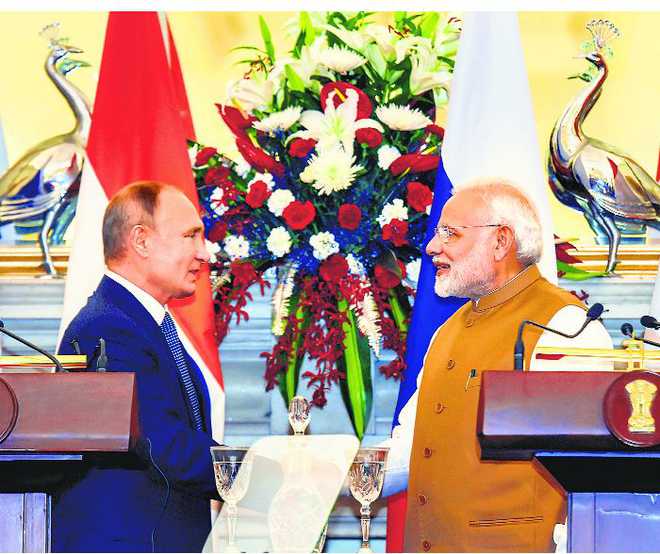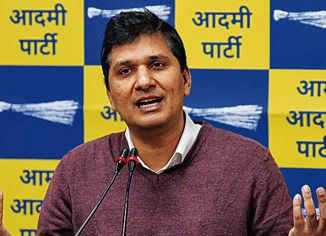
The signs of Indo-Russia trade diversification should be fleshed out with fresh tieups.
Sandeep Dikshit
The Russia spy saga in the West is yet to completely play out. In fact, part two of the spy act has opened in Norway with two Russian intelligence operatives being accused of hacking into a UN server. Part one of the spy saga took place in the US, where Russia has been accused of influencing the last Presidential polls. The political indignation in the US spawned a new law — Countering American Adversaries Through Sanctions Act (CAATSA) — that goes into action in less than three weeks.
India shouldn’t have anything to do with that except that the new law also ostracises any country that trades with the Russian industrial military complex. That is a big task for India whose almost all military offensive platforms are of Russian origin. But PM Narendra Modi, and now his Army Chief, have spelt out their defiance to the American enjoinment on observing CAATSA in spirit by observing abstinence on fresh Russian trade deals.
An innocuous sentence tucked into wearingly long Indo-Russia joint statement announced the end of Indo-Russian negotiations for the S-400, the world’s most lethal missile systems available in the ‘open market’. And now the Army Chief, Gen Rawat, has spoken about the inevitability of both countries jointly manufacturing Russian-origin helicopters as well as other weapon systems.
Despite some bad deals such as the ruinously expensive INS Vikramaditya (Admiral Gorshkov in the Russian avatar), there has been a measure of political comfort in Indo-Russian deals. During the high noon of dependency, Moscow maintained close contacts with Indian communist parties but made no demands on India’s socio-economic and political system. India also maintained its independence of action and judgment on issues of international importance. Twice, Indira Gandhi rejected Brezhnev’s doctrine on an Asian regional security arrangement under Moscow’s tutelage. India did not join the West in condemning Soviet intervention in Afghanistan but its PMs spared no opportunity to counsel the Soviets about the risk of getting bogged down in Afghanistan.
On terrorism, too, Russia had agreed to the Indian formulation well before the US woke up after the September 11 attacks. Previous joint Indo-Russian statements not just condemned extremism and terrorism ‘in all forms’, but also spoke against states that ‘aid and abet and directly support cross-border and international terrorism’, which loosely amounts to an indictment of Pakistan’s meddling in Kashmir.
In contrast, New Delhi has to remain constantly alert about Pentagon’s formulations on terrorism, tailored as they are to serve purely American interests. The platform provided to Khalistani radicals in Canada and the UK speaks of an ever-present willingness to use extremism as a calibrated pressure point against both irredeemable and corrigible nation states.
China is already facing the heat for buying Su-35 fighters and S-400 spares from Russia. A Chinese Lieutenant General is no longer eligible for US visa while the importing company will be denied US foreign export licences, banned from making foreign exchange transactions within US jurisdictions, prohibited from using the US financial system and all its US property attached.
India should logically be the next in line when it makes the advance payment for the S-400 systems. Neither the Indian elites nor South Block’s strategic requirements can countenance such a break. The entire purpose behind holding frequent military exercises with the US (over 100 at the last count) is to use the threat of joint war-fighting against China, if the need arises.
So while we wait for the US to rule whether the S-400 deal is kosher or not, it will be a good idea to take up the latest Russian offers on easy entry into the rarified space club as well as opening new vistas for oil and trade routes. The Modi-Putin discussions specifically touched three areas. In space, Russia will join forces to send an Indian into space. Russia is the only one that has also answered the long Indian quest for a ground station at northern latitude where satellites pass by at low orbit making signal downloading easier.
The second is the offer of oil and gas blocks off the Arctic shelf, the last frontier for humungous resources of oil and gas. The third is intimately tied with the second — as ice melts and the Arctic channel becomes navigable round the clock, Russia has offered a helping hand. Putin has put a lot of store on pivoting towards Asia as well as developing his country’s Far East. This could be India’s moment to be one of the first movers in a virgin sector.
However, the onus of responding is valid only if India gets its act together. The quality of resource personnel is negligible or poor. The ideation on various aspects of exploiting the Arctic still remain scattered among several government departments. It may be a good idea to frame an integrated Arctic policy in order to ensure an early harvest.
The Russians are serious about developing an area that is still not subject to great power rivalry, with Putin having renewed the Soviet-era technical studies that were frozen during the belaboured 90s. India’s participation in tandem with Russia on land still remains problematic — there are strategic divergences on Afghanistan and Pakistan, and even China. But it needs to shed its ambivalence on the frontiers of technology and the earth.
Washington’s reaction to the S-400 deal will be a litmus test for Indo-Russia military ties as much as for judging the extent of American understanding of India’s security imperatives. There is a growing clamour to punish Moscow more severely for the alleged hacking for a UN server and the complications in Indo-Russia arms trade may increase. India can do the balancing by not making arms trade the only talking point of Indo-Russian ties. Mega Russian investments in Indian oil and steel are already a reality. India now needs to quickly leverage the opportunities in Russia on offer.





















